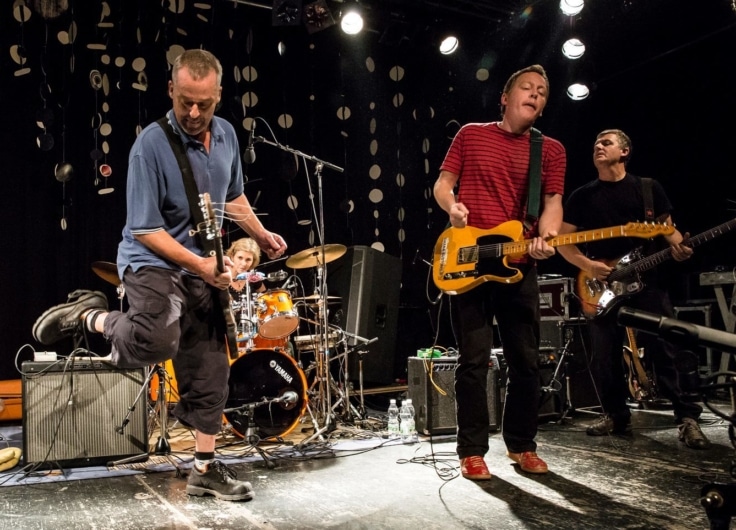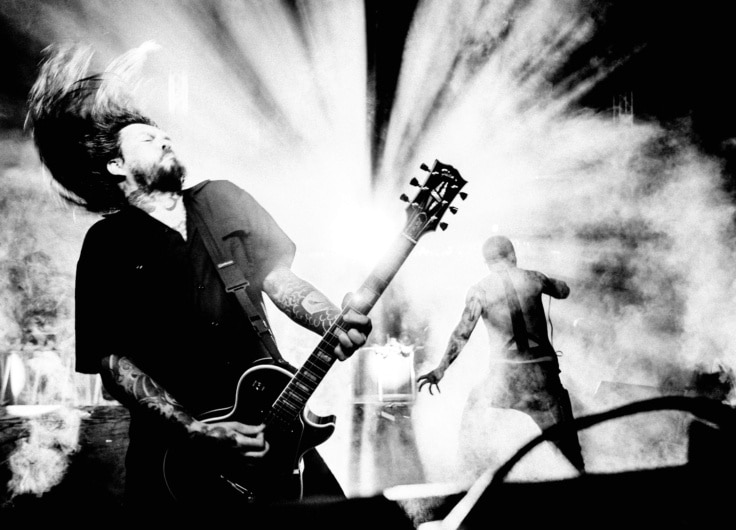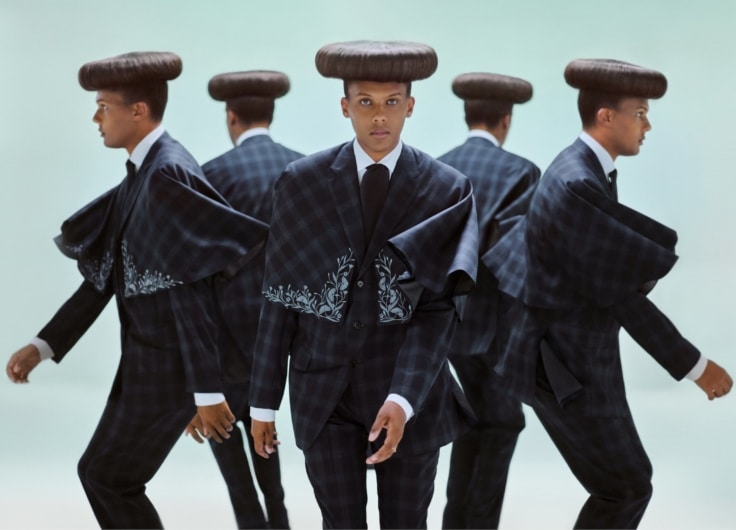Nits Have Been Painting With Sounds For Fifty Years
The Amsterdam pop group Nits is celebrating their anniversary with a tour and an EP that sounds as timeless as it is stimulating. Their intelligent pop music sounds both refined and very European. ‘We’re always looking for the clear line, as if we were drawing Tintin.’
“If it is true that our work has stood the test of time, it may be because we never collaborated with a trendy producer,” says singer, lyricist, composer and multi-instrumentalist Henk Hofstede (b. 1951). Nits produce rich and intelligent pop music that has at times been labeled as artsy. Hofstede is not entirely happy about that. “When I grew up in the sixties, pop was never intended to be an art form. We just wanted to be a band that writes and sings songs.”
Nevertheless, Hofstede studied at the Rietveld Academy and has a background in visual arts. Quite a lot can be deduced from songs like ‘A Touch of Henry Moore’, ‘Soap Bubble Box’ (about the American artist and filmmaker Joseph Cornell) and ‘Bauhaus Chair’; or from record sleeves in the spirit of Magritte and Mondrian. Nits paint with words and sounds and are not entirely averse to literary influences. ‘Nescio’ was an ode to the writer of the same name, while one of the band’s most popular songs, ‘In the Dutch Mountains’, was inspired by Cees Nooteboom’s In de Bergen van Nederland.
Hofstede emphasizes the fact that he has read quite a bit of poetry, but is certainly not someone who devours books. “I rarely reflect on what I find beautiful, because when you do you risk slipping into admiration. Novels or works of art cannot simply be translated into a song. I tried that once and I am well aware that it can turn out wrong. At best you can only illustrate something that already exists.”
Incalculable curiosity
In their early days, Nits had a new wave vibe in the vein of XTC and the like. But after a while they threw off their Anglo-Saxon influences and found a more European sound. Hofstede explains that the group only found its own voice with the 1983 LP ‘Omsk’: “When Robert Jan Stips joined us, his lyrical keyboard playing changed our sound. The guitars disappeared into the background, then Rob Kloet introduced an unconventional drumming style and the studio was transformed into a kind of playground for instruments. In short: an incalculable curiosity crept into our music.”
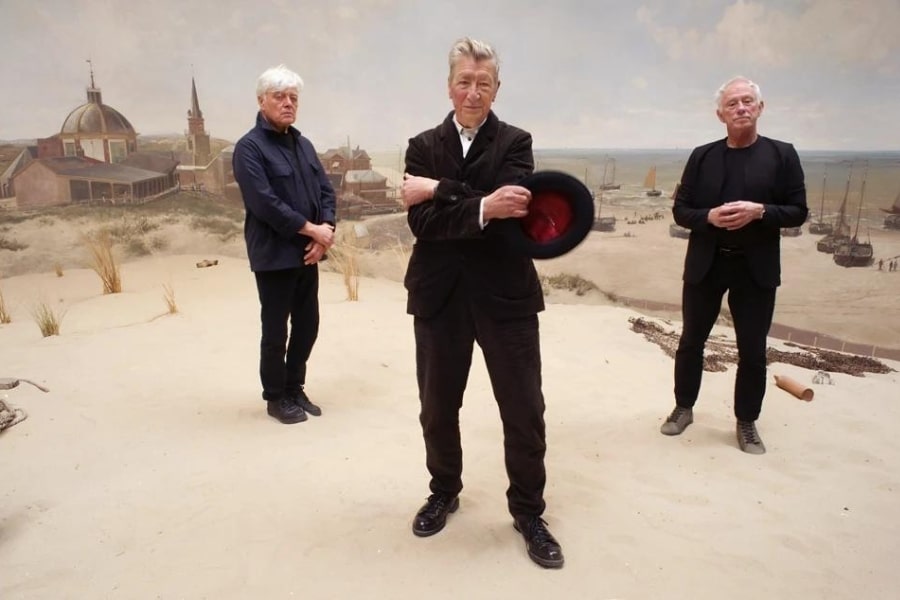 Henk Hofstede (center): 'I rarely reflect on what I find beautiful, because when you do you risk slipping into admiration.'
Henk Hofstede (center): 'I rarely reflect on what I find beautiful, because when you do you risk slipping into admiration.'© Wim van de Hulst
The lyrics also absorbed some new influences. Although their lingua franca remained English, Nits began to occasionally sing in Italian (‘Tutti Ragazzi’), Turkish (‘Vah Hollanda Seni Seni’) or French (‘Les Nuits’). At times even used more than one language in a particular song, as they did in ‘Adieu Sweet Bahnhof’. Their work has also incorporated some exotic words such as Alankomaat (Finnish for ‘Netherlands’). Has there been a deliberate attempt on their part to develop their own European vocabulary?
“The languages we used reflected our universe,” Hofstede explains. “As a band, we were always curious about the unknown and lured by adventure, which explains our unbridled wanderlust. We often toured France, Switzerland and Greece, played in Moscow and Tokyo. Getting to know all those foreign cultures left its mark: it gave us new perspectives. Touring showed us a world where people looked at us in a different way, where we were judged differently than we were in the Netherlands.”
In 1982, Nits ended up in Finland for the first time, although Hofstede, together with some school friends, had already traveled there during the seventies. He thought that Finnish, incomprehensible though it was, emanated an immense beauty. The language captured his imagination to such an extent that some Finnish words naturally crept into his lyrics. Many of Nits’ songs, about cities or geographical places, seem to take the form of musical postcards. “If we had always stayed in Amsterdam, many great things would have passed us by. I can be moved by the landscapes of, say, the United States, but then I miss the colours and diversity that are to be found in Europe. What I mean is: in America, there are no places like Venice, Berlin or Barcelona.”
Tintin
Over the past half century, Nits have regularly changed their line-up. The only member who has completed the entire journey together with Hofstede is drummer-percussionist Rob Kloet. “The secret of our collaboration? A lot has to do with friendship,” the singer says. “Some drummers are guilty of cocky behavior, but Rob is modesty itself. You won’t easily catch him doing a drum solo. Maybe sometimes there is a suspicion of a drum solo, but only as a form of play.”
Since 1974, the year that Nits first appeared on the scene, the world has changed dramatically. When asked about his artistic development since those early days, Henk Hofstede answers that as an author he now dares to be “more sparse” and that he has mastered the art of deletion. “I decide exactly what I want to say and have learned to avoid all unnecessary frills. The ability to separate the essential from the incidental is the highest good for a songwriter. With the technological options available today, you run the risk of going off in all directions. Sometimes you have to work like Giacometti, the Swiss sculptor who honed his sculptures so much that at the end he was left with something like a … needle.”
Sometimes Henk Hofstede’s lyrics are purely based on sound. During rehearsals he sings whatever comes to his mind, without thinking about it, only to later discover that certain words have become defining building blocks of the song. “Some stories surface unconsciously: spontaneous, throw-away utterances may turn out to have a deeper meaning afterwards. Of course there is an editing process, similar to editing a film, because sometimes I simply try to say too much. Hence, I don’t make myself clear enough or I am liable to digress. So I always look for the clear line. You could say It’s like drawing Tintin.”
Henk Hofstede: 'I decide exactly what I want to say and have learned to avoid all unnecessary frills'
If there is one album from Nits’ extensive discography that is still close to Hofstede’s heart, it is ‘Giant Normal Dwarf’ (1990), a response to the success of the release, three years earlier, of ‘In The Dutch Mountains’.
“We had closed a chapter with the live recording ‘Urk’ (’89), a kind of best of. So with ‘Giant Normal Dwarf’ we started with a clean slate. You can’t call it a real tabula rasa, because you always carry your baggage and your skills with you. But while our entourage thought we should become even bigger, we stopped and asked ourselves: what do we want? To become extremely famous? Or to keep surprising ourselves and create exciting things that we enjoy? We opted for freedom and experimentation, for challenge and unpredictability. ‘Giant Normal Dwarf’ was a pivotal moment for the group. It was also in that period that I became a father for the first time, which was another turning point in my life.”
Poetic side road
Nits’ songs usually waver between playful and melancholic, between dreamy and surreal. The reverse logic of ‘With Used Furniture We Make A Tree’ testifies to the latter. But occasionally current events break through in all their intensity: ‘Crime and Punishment’ was about the car bomb attack in which artist Rob Scholte lost both his legs. Three songs from the album ‘Les Nuits’ were about the murder of filmmaker Theo van Gogh. What was it about those events that left Hofstede with no choice but to write about them?
“I knew Rob personally. Like me, he was a musician and former Rietvelder. The attack on Van Gogh happened here in Amsterdam East, more or less around the corner, and had an enormous impact on my neighbourhood. At that time we were working on ‘Les Nuits’, a record that sounded quite heavy and dark. So the atmosphere of danger and misery in the city naturally matched what we were doing.”
Nits are not immediately known as a political band, but in a song like ‘Bad Government and Its Effect on Town and Country’ their anger and indignation are clearly palpable: “Bankers and robbers / Are partners in crime / Politicians / Lying all the time.” “In the Palazzo Pubblico of Sienna I once saw three large frescoes by Ambrogio Lorenzetti, entitled ‘Allegory of Good and Bad Government’,” Hofstede remembers. “Those frescoes were the impetus. When a country becomes more right-wing or less socialist, I start having misgivings right away. My roots are working class: my father, uncles and grandfathers were all labourers, so they all voted for the PvdA (the Dutch labour party, DS). Personally, I have a hard time singing about politics. I think that, like Ray Davies in ‘Dead End Street’ or Elvis Costello in ‘Shipbuilding’, you would do well to take a poetic side road. If lyrics become too pushy or slogan-like, your accuracy is likely to be compromised.”
Henk Hofstede: 'I have a hard time singing about politics. You would do well to take a poetic side road'
Over the years, Nits’ songs have become increasingly impressionistic, leaving gaps that listeners have to fill in for themselves. “This way you create your own landscape, your own memory, and you continue to cherish that. As an eighteen year old I did that with, for example, a record like Bob Dylan’s ‘John Wesley Harding’. What Dylan himself meant by it did not seem so important to me at the time.”
Trauma
For Hofstede, the road to his group’s fiftieth anniversary was strewn with serious obstacles. On May 16, 2022, De Werf, Nits’ headquarters and studio space for forty years, went up in flames. Because all their instruments, archives and master tapes were lost in the fire, it was a truly traumatic event. That devastating loss is central to their latest EP ‘Tree House Fire’. Is that particular record an attempt to turn that disaster into something positive?
“Our colleague Spinvis sent us a message right away, saying: ‘What happened is really sad, but you’ll have to deal with it. You’d better try and make something out of it!’ Despite our dismay, we had a similar thought ourselves. Everything was gone. It was the end of an era. So I started writing down what that felt like, making drawings of all the instruments that had been destroyed by the fire. It turned out to be a healing process. It helped me to avert the disaster, to return the building and its contents to an almost dreamlike form. And always in festive colors, which seemed to show that the fire had not defeated us. If a painter were to lose all his canvases, the disaster would be irreparable. But our music is still out there and can emerge anywhere in the future.”
Shortly after the fire, Hofstede was diagnosed with a rare autoimmune disease, a condition that is currently more or less under control thanks to medication. “I’m still testing my limits, but every day I get a little better and feel more energetic. I’ll definitely have to figure out how to deal with my limitations in the future. Still, it’s a relief that we managed to make a new record. I hope that soon I’ll be able to muster all the eagerness and energy necessary to complete a full live performance again.”
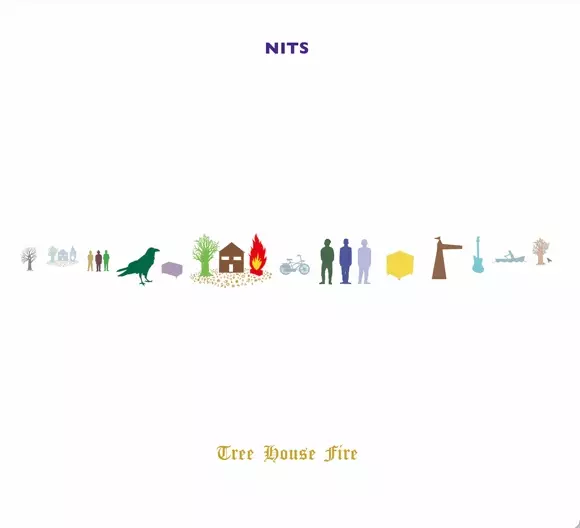
Over the past year, Hofstede has been working on a visual logbook, with stills from videos he once recorded during international tours. This makes it possible to follow his group on endless highways, in trains and airports, dressing rooms and studios. It’s been a nostalgic but also surprising voyage of discovery, because the singer had long forgotten much of what he had filmed in the seventies and eighties.
But all that looking back makes Henk Hofstede yawn… Result? Nits’ next album is almost finished. “We don’t feel like playing ‘In the Dutch Mountains’ again, night after night. We still feel the urgency to do something new. Wouldn’t it be great if we managed to reach our sixtieth anniversary in ten years’ time?”
Tree House Fire is released by Werf Records.


